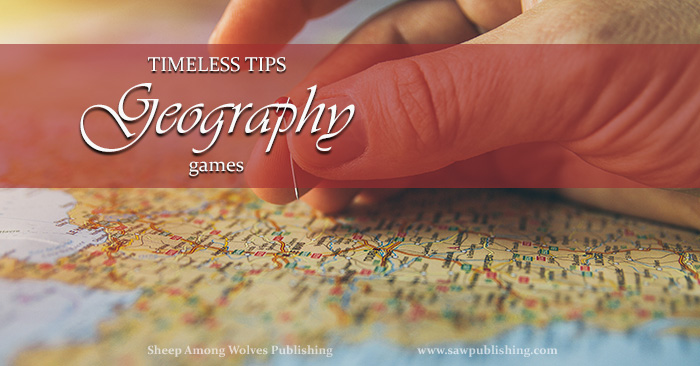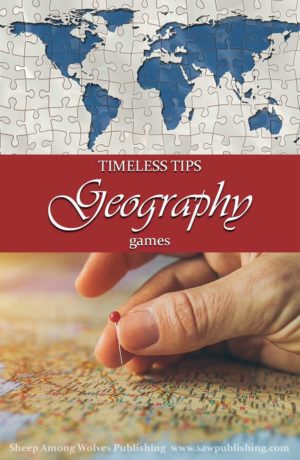How to Replace Geography Quizzes with Geography Games
Timeless Tips from Educators of the Past is a companion series to our Timeless Tips from Homemakers of the Past – highlighting useful and thought provoking advice from the generations of educators who have gone before us. Our goal at Sheep Among Wolves is to provide a forum for Good and Great literature, and to help you in your quest for godly, high-quality resources. It is our hope that these Timeless Tips will be an aid and encouragement to you as you strive to follow the example of Deuteronomy 6 and diligently teach your children the words of the Lord.
 Have you ever been to another country, another province, another state? Do you remember how different everything was from anything you had previously experienced? Do you remember how the trees and plants were all new and unfamiliar, how the architecture was unlike architecture back home, how everything was strange and wonderful—the people, the landscape, perhaps even the smells and sounds?
Have you ever been to another country, another province, another state? Do you remember how different everything was from anything you had previously experienced? Do you remember how the trees and plants were all new and unfamiliar, how the architecture was unlike architecture back home, how everything was strange and wonderful—the people, the landscape, perhaps even the smells and sounds?
Do you remember what you learned about that place while you were there? Anecdotes of past happenings; customs, habits and merchandise that will forever remind you of that place?
You were learning geography then, though you might not have known it. You were learning about other places, and what makes them unique and memorable. And because it was your own experience, and not something unwillingly taught to you, it interested you, and you enjoyed it.
If only geography could always be like that!
How Do You Get Children to Internalize Geography?
In teaching geography, as well as in teaching any other subject, it is easy to lose focus of what we are really aiming at. As Jane Anne Winscom observed in her book, Dear Old England (1860):
“Geography should convey ideas, rather than hard names; it should exercise comprehension as well as memory; it should associate places with history, scenery, climate, produce, and inhabitants.”
One of the tools Winscom relied on to secure this end was creative games and assignments in the place of quizzes or tests.
The Value of Geography Games
The most natural and genuine way of learning geography is by personal travel. Assimilating geography by personal experience removes the artificiality of second-hand learning, and has a higher chance of being internalized.
However, in most cases, this kind of personal experience is not possible in sufficient quantity to cover all the geography we want to teach our kids. It gets expensive and time-consuming very quickly!
But what we can take from this is that the important thing is securing the child’s interest in the subject, and this can be done very effectively through geography games.
Geography Games from Educators of the Past
 We have included here a number of geography games from Dear Old England. The links below go through to the pages of the book, where there are generally examples in dialogue form depicting the games in action.
We have included here a number of geography games from Dear Old England. The links below go through to the pages of the book, where there are generally examples in dialogue form depicting the games in action.
We have linked to the single-page display format for greater ease in locating each game. Some games span more than one page. There are right and left arrows at the bottom of the window allowing you to flip between pages.
As always, this Timeless Tip aims at highlighting useful concepts, but is not a review or recommendation of the textbook quoted. Please use personal discretion.
Notes:
1) Some of these examples may look difficult, since in places they contain allusions to fairly obscure geographical facts, but it is important to remember that the chapter(s) preceding the game have included all the facts being alluded to. The games are easily adapted to whatever type of geography you have been studying.
2) The use of rewards and/or forfeits in some games is a matter of personal choice. Keeping score by points can easily be used instead. Or the competitive side of the games can be left out altogether. The personalities of individual children, as well as the preference of the teacher, can dictate this.
The Commercial Traveller is an excellent guessing game for reviewing the products of cities or countries.
The Post Office provides a creative way to review the ground you’ve covered at regular intervals throughout the year, fixing facts in students minds and letting them exercise their imaginations as well.
The Lord Mayor’s Table is a quick and entertaining game for reviewing the edible products of a district.
A Voyage Down the English Coast (adaptable to all coastal geography) is a guessing game, somewhat resembling Twenty Questions, but requiring both the questioner and the questioned to recall the geographical facts they have previously learned.
Note: When you follow the link, this game is located half-way down the page. It does not have a heading with the title but can be readily located midway through the second paragraph.
The Shopping Game (Game of Yorkshire) is another great way of reviewing the products of different cities, counties, states, or countries. The example shows students reviewing the county of Yorkshire, but the idea is easily adapted to any location.
The Traveller’s Gifts (Game of Lancashire) follows a similar idea to the previous game, but requires students to match products with their appropriate sources.
Note for teachers: the “right-hand” team has a significantly easier job than the “left-hand” team. If you have a multi-aged homeschool class, this offers a perfect opportunity to manage the difficulty level for different children. If your students are all on the same level, the game can be equalized by having the two teams switch places part way through.
Supplies for the Emigrant is yet another imaginative game for reviewing principle products. In addition, it offers a great opportunity to tie geography into history/social studies. While the example in Dear Old England depicts a nineteenth century emigrant travelling from England to Australia, the scenario can be easily varied to fit in with any era or location. Some type of large-scale immigration from one area to another has been going on throughout most of history!
The River Rolls (Game of the Severn) reinforces information about landmarks and places of interest. Although named after the British River Severn, this game may be adapted to any watercourse. It also offers an excellent tie in for history/social studies by providing a unique perspective on travelling in days when rivers formed major trade routes around the world.
How to Replace Geography Quizzes with Geography Games
If we could visit every place in the world, and drink in the strange and wonderful new things with all our senses, remembering with vividness and affection each unusual detail—no doubt that would be the best way of learning geography.
But just because we can’t do that, doesn’t mean we need to learn through dry, uninteresting means that teach us—more than anything else—the habit of learning only to forget.
The purpose of teaching is to fix information in the pupils’ minds, and if we can do this better through games than through quizzes—why not?
Let’s make learning fun, so that in taking interest in their subject, our students grasp and retain geography in a way that will continue to impact their general knowledge and information long after they’ve forgotten question A from quiz 7 in 6th Grade geography.
Teaching in a way that secures a child’s interest is one of the best strategies for making sure that they actually learn what they are taught.
For more information about our ongoing series of Timeless Tips from Educators of the Past see our previous post:
You might also enjoy:

Do you struggle with feeling “unprofessional” in your daily work? Don’t forget that the amateur phase has special blessings of its own!

Looking for ways to in integrate preschoolers in your homeschool day? Here are five great tips for occupying little ones during school hours.

Is reading aloud really worth the effort? This post takes a look at some of the lasting benefits which come from reading aloud as a family.
- How to Make Vocabulary A Family Pursuit with the FREE Word of the Week (WOW) Program
- What If My Student Hates Writing?

